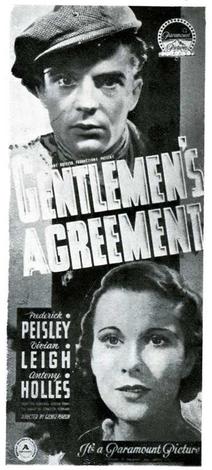| Gentlemen's Agreement | |
|---|---|
 | |
| Directed by | George Pearson |
| Written by | Jennifer Howard Basil Mason |
| Produced by | Anthony Havelock-Allan |
| Starring | Frederick Peisley Vivien Leigh Anthony Holles |
| Cinematography | M. A. Andersen |
| Edited by | Roland Reed |
| Music by | Lee Zahler |
Production company | |
| Distributed by | Paramount British Pictures |
Release date |
|
Running time | 71 minutes |
| Countries | United Kingdom United States |
| Language | English |
Gentlemen's Agreement is a 1935 British, black-and-white, adventure film directed by George Pearson and starring Frederick Peisley as Guy Carfax and Vivien Leigh as Phil Stanley. [1] It was produced by British & Dominions Film Corporation and Paramount British Pictures. According to the British Film Institute, there is no known print of this film.